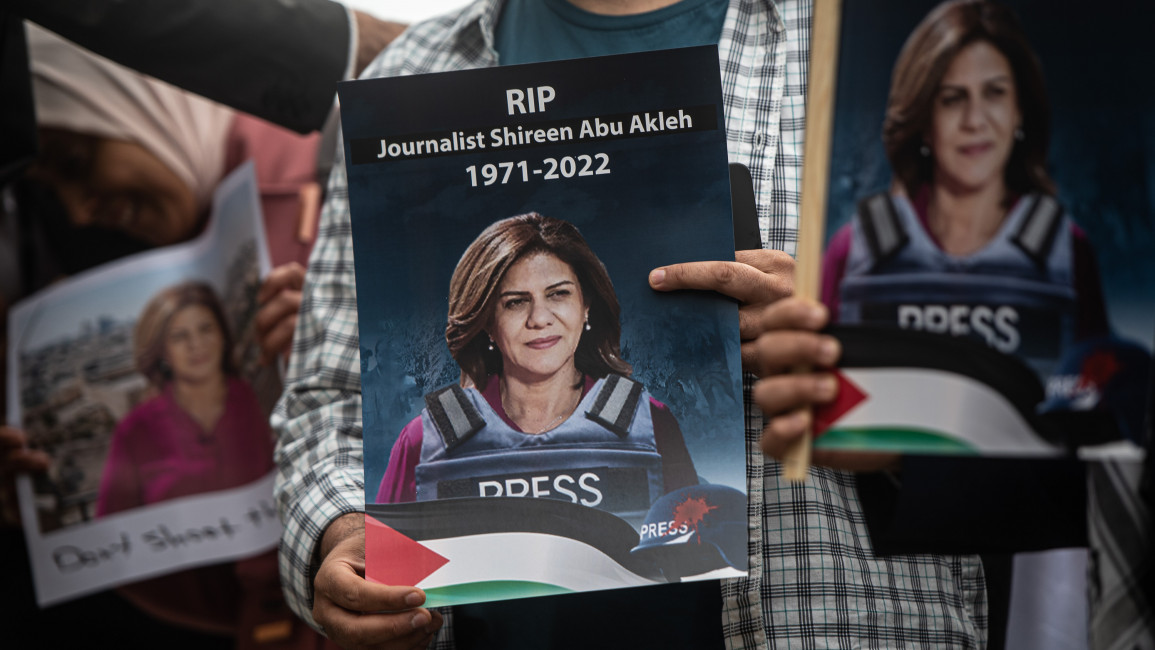Perspectives
Hebh Jamal
23 May, 2022
Following the killing of Shireen Abu Akleh, political figures in the US expressed ‘outrage’ and offered their condolences, but this means nothing in the face of their continued support for Israel which includes considerable aid, writes Hebh Jamal

Some US politicians spoke out against the death of Shireen Abu Akleh, but many are critical of their calls for investigations given their continued support for Israel. [GETTY]
“When I arrived in Jenin, I did not expect to relive this overwhelming feeling” Palestinian journalist Shireen Abu Akleh wrote last October.
“Jenin is still the same inextinguishable flame that is home to fearless young men who are not intimidated by any potential Israeli invasion” she said. “In Jenin, we met people who have never given up hope; they have not allowed fear to infiltrate their hearts and have not been broken by the Israeli occupation forces.”
Tragically, it was under a similar Israeli invasion in the same occupied Jenin that she spoke about, that Shireen Abu Akleh fell to an Israeli sniper that targeted her and her Al Jazeera colleagues. Abu Akleh was covering an Israeli army raid on the Jenin refugee camp when she was shot in the face by a single bullet, despite wearing a press vest and helmet.
Producer Ali al-Samudi was also shot in the back.
In a statement, Al Jazeera said Abu Akleh was “assassinated in cold blood.”
Shireen’s death sent shockwaves all across the Arab speaking world, specifically amongst Palestinians throughout the diaspora who grew up watching Shireen’s groundbreaking and uncensored coverage of the Israeli occupation.
''Beware of passive mourners who believe there needs to be a rationalisation of Israel’s violence, especially when they vote to provide the means for that violence. An example is an individual like Secretary Antony Blinken, while claiming that he is “troubled” by Israel’s actions, is more than happy to staunchly and unconditionally vote to provide arms and aid to the settler colonial state.''
I was in my father’s house here in New York, with Al Jazeera in the background, as usual, when he stood up in utter shock at the breaking news announcement.
“I can’t believe it,” he said. “They killed a hero.”
Abu Akleh’s death garnered thousands of condolences, even from outspoken pro-Israeli individuals.
Senator Ben Cardin, a senior Democrat and outspoken backer of strong US-Israel ties, said he was “disturbed” by the killing of Abu Akleh.
“Abu Akleh’s death is an attack on a journalist who was wearing her press gear,” he said in a statement. “No journalist should be killed while simply doing their job. I strongly condemn her death and call for an independent and thorough investigation into the incident.”
“The killing of American journalist Shireen Abu Akleh is a horrific tragedy,” House Speaker Nancy Pelosi, a staunch supporter of Israel, wrote on Twitter.
“A thorough, objective investigation is needed now. Congress is committed to the defence of press freedoms worldwide and protection of every journalist, particularly those in conflict zones” she said.
Even the US State Department spokesperson, Ned Price, said that he was “heartbroken” over the killing of Shireen Abu Akleh and claimed that they “strongly condemned her killing.”
“We call for an immediate and thorough investigation and full accountability.” Price said. When a journalist questioned whether an Israeli military-led investigation would be considered credible, Price stated that the Israelis “have the wherewithal and the capabilities to conduct a thorough, comprehensive investigation.”
We need to be sceptical of the intentions from what I want to call, passive mourners. Although many of us are mourning the loss of a national icon, we must be alert of both-sides rhetoric that is dominating the narrative surrounding Abu Akleh’s death.
All of a sudden Democratic politicians, liberal organisations, and newspaper editorials are condemning the killing of Shireen Abu Akleh without mentioning exactly who they are condemning, and calling for an investigation that Palestinians can guarantee is far from impartial.
Israel's legal system is a farce. Palestinians under Israeli control in the West Bank are tried in military courts- as opposed to civil courts where their Jewish counterparts are tried in-and the odds of a fair trial are stacked against them. Not only are the trials conducted in Hebrew with little translation usually lasting only 10 minutes, but the rights of defendants are not properly articulated, forcing the great majority to plead guilty and accept plea bargains.
In an Israeli military court, the testimony of a soldier can be enough to send even a minor to prison. Over 99 percent of the trials of Palestinians in Israeli military courts ended in convictions (or 25 acquittals out of 9542). How Israel’s legal system treats occupied Palestinians tells an obvious story that their allegiance is not with the truth.
Let’s also not forget Israel’s immediate reaction to Shireen Abu Akleh’s killing. They were quick to deflect blame by posting a decontextualised video confirming it was indeed Palestinian gunmen in Jenin who shot our beloved journalist, and not Israeli soldiers.
RELATEDPerspectivesSam Hamad
There was no investigation, no effort to right a wrong, only a last ditch attempt to deflect blame.
Al Jazeera journalists’ eye witness accounts that told the world that it was Israeli soldiers who killed Shireen were enough.
Not believing victims of Israeli violence is not new for Western political pundits. It is instead more appropriate to assign character assassinations in their effort to logically explain Israel’s actions- a colonial state that the West desperately wants to believe is democratic.
On April 5, 2018, the world lost another journalist by Israeli snipers: Yasser Murtaja. Murtaja was covering the second Friday protests during Gaza’s Great March of Return when he was shot in the abdomen, despite him wearing a flak jacket clearly marked with the word ‘press’ on it.
The Jerusalem Post reported on Murtaja’s death with the horrid headline: Journalist or terrorist? Who really was slain Gazan Yaser Murtaja? The article reported on Israel’s security officials that labelled Murtaja as a Hamas operative. While the author concedes that Israel presented no proof to its claims, it ends with the author asking the dishonest question of “who was Yaser Murtaja?”
Palestinians, once again, need to prove their own humanity even after death.
When Israel killed Shireen, then raided her home hours after her death, or even attacked her burial proceeding, Palestinians understood this was the cost of being a voice of Palestinian resistance.
Israel criminalises Palestinian bodies in life and in death, deploying its colonial violence throughout every point of Palestinian life. Israel sees even dead Palestinians as agents of resistance against the occupation.
Beware of passive mourners who believe there needs to be a rationalisation of Israel’s violence, especially when they vote to provide the means for that violence. An example is an individual like Secretary Antony Blinken, while claiming that he is “troubled” by Israel’s actions, is more than happy to staunchly and unconditionally vote to provide arms and aid to the settler colonial state.
Shireen Abu Akleh was murdered because she is Palestinian. Her death signified once again that no one is safe from Israel’s state sponsored violence. It affirmed to the world that for Israel, respecting the slain Palestinian would set a precedent in humanising their existence when alive.
We do not need the condolences of enablers, we need an end of US aid to Israel- for only a free Palestine could have prevented the death of the Palestinian national hero, Shireen Abu Akleh.

Hebh Jamal is a Palestinian American journalist based in Germany.
Follow her on Twitter: @hebh_jamal
Have questions or comments? Email us at: editorial-english@alaraby.co.uk
Opinions expressed in this article remain those of the author and do not necessarily represent those of The New Arab, its editorial board or staff.
No comments:
Post a Comment